

One Token, Two Sides: Data Dysphoria & Fantasies of Control. Image by Robert Herian New data horizons.
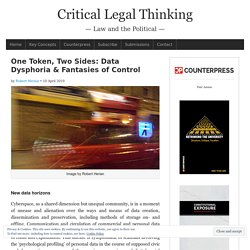
Martti Koskenniemi: Indeterminacy. Team EN. Dr. iur.

Gieri Bolliger, executive director of TIR, is an attorney-at-law and has been working for TIR since 2000. He took over management of the foundation in 2007. After he published his dissertation on European Animal Law in 2000 (summa cum laude), he became known well beyond Switzerland. Since then, he has worked as an editor, author and co-author and has published twelve books, including "Das Tier im Recht - 99 Facetten der Mensch-Tier Beziehung von A bis Z" (2003), the guidebook "Tier im Recht transparent" (2008), the short commentary "Schweizer Tierschutzstrafrecht in Theorie und Praxis" (2011, fully revised edition in 2018), the monograph “Sexualität mit Tieren (Zoophilie) - eine rechtliche Betrachtung” (2011), and the English book "Animal Dignity Protection in Swiss Law - Status Quo and Future Perspectives" (2016).
The Disorder Of Things. The third post in our symposium on Brenna Bhandar’s Colonial Lives of Property is by Sara Salem.

Sara is an Assistant Professor in Sociology at the London School of Economics. Sara’s research interests include political sociology, postcolonial studies, Marxist theory, feminist theory, and global histories of empire and imperialism. The Democracy To Come: Notes on the Thought of Jacques Derrida. Key Concept “The democracy to come” (la démocratie à venir) is perhaps the most enduring principle that emerges from Derrida’s later work.
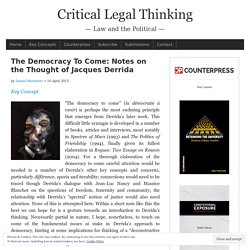
Imperium: notes on the thought of Spinoza. Key Concept Cartesian cosmology Note: readers should first study the key concepts Power (potentia) and Natural Right before proceeding.
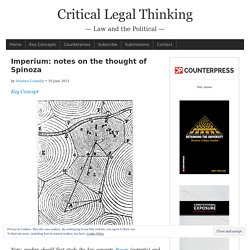
A practical comprehension of Spinoza’s theory of natural right allows us to begin to use this conceptual tool to construct our world. This is the essence of Spinoza’s ethico-political project: how to use the doctrine of natural right to construct machines that increase our power. Consequently, when we come to the question of the organisation of society, virtuous law and politics amount to the endeavour to build-right augmenting machines, which Spinoza calls imperia. Let us begin our brief survey with Spinoza’s definition of sovereignty in his Tractatus Politicus (“TP”) II[17]: Hoc ius, quod multitudinis potentia definitur, imperium appellari solet. Giorgio Agamben: Stasis. Key Concept At a time when the world seems to be rejecting the universalist neo-liberal logic of governance to embrace various modes of cultural, political, socio-economical, and juridical nationalisms, an engagement with Giorgio Agamben’s concept of stasis becomes all the more urgent.
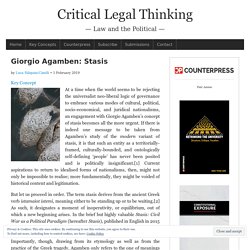
Constitutional Exposure. Constitutional Exposure: A Postulation for Democracy to Come Pablo GhettiBrazilian diplomat and former lecturer in law (University of Exeter) B & W 229 x 152 mm | Perfect Bound on White w/Matte Laminate | 226 pages | Paperback ISBN 978-1-910761-04-5 | E-book (PDF) ISBN N/A | 28 August 2017 description Constitutional Exposure identifies and then builds on the principal postulation in Jacques Derrida’s discourse on ‘democracy to come.’
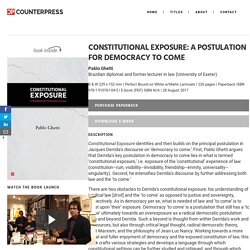
Sovereign Exception: Notes on the Thought of Giorgio Agamben. Michel Foucault: Discipline. Key Concept High Court of Australia Building (Canberra).
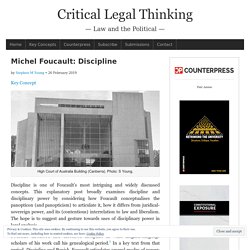
Photo: S Young. Discipline is one of Foucault’s most intriguing and widely discussed concepts. This explanatory post broadly examines discipline and disciplinary power by considering how Foucault conceptualises the panopticon (and panopticism) to articulate it, how it differs from juridical-sovereign power, and its (contentious) interrelation to law and liberalism. The hope is to suggest and gesture towards uses of disciplinary power in legal analysis.
Yale Law Journal - Amazon’s Antitrust Paradox. Abstract.
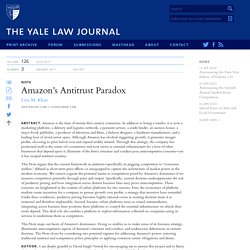
Amazon is the titan of twenty-first century commerce. In addition to being a retailer, it is now a marketing platform, a delivery and logistics network, a payment service, a credit lender, an auction house, a major book publisher, a producer of television and films, a fashion designer, a hardware manufacturer, and a leading host of cloud server space. Although Amazon has clocked staggering growth, it generates meager profits, choosing to price below-cost and expand widely instead. Through this strategy, the company has positioned itself at the center of e-commerce and now serves as essential infrastructure for a host of other businesses that depend upon it. Elements of the firm’s structure and conduct pose anticompetitive concerns—yet it has escaped antitrust scrutiny. In The Crosshairs: Federal Government Finds Itself At The Centre Of Rights-Based Climate Litigation In Environnement Jeunesse v. Attorney General Of Canada - Litigation, Mediation & Arbitration - Canada.
In 2015, the case of Urgenda Foundation v.
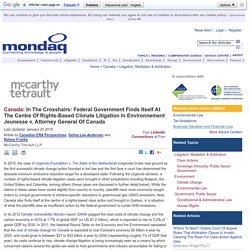
The State of the Netherlands (Urgenda) broke new ground as the first successful climate change action founded in tort law and the first time a court has determined the absolute minimum emissions reduction target for a developed state. Following the Urgenda decision, a number of rights-based climate litigation cases were brought in other jurisdictions including Belgium, the United States and Colombia, among others (these cases are discussed in further detail below). While the claims in these cases have varied slightly from country to country, plaintiffs have most commonly sought orders to compel governments to achieve specific reductions in greenhouse gas (GHG) emissions.
Now, Canada also finds itself at the centre of a rights-based class action suit brought in Québec, in a situation of what the plaintiffs view as insufficient action by the federal government to curtail GHG emissions. Reading Statutes & Cases. Ask any undergraduate law student the bane of their essay writing life, and they’ll come back with one word: structure! Gone are the days of PEE (point, evidence, explanation – who can forget?!)